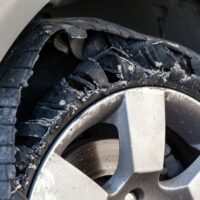How Blowouts Can Lead to Car Accidents

Cars are made up of many different parts that all need to work in unison for the car to run safely. When one part is faulty or damaged, it can be hazardous to operate the vehicle on the road. Tires are one of the most important components on your vehicle. When a car has a tire blowout, an accident often occurs. Such an accident can cause injuries, and victims may be eligible for compensation.
Common Causes of Tire Blowouts
A tire blowout can lead to significant repair costs, but the worst outcome of tires failing on the road is a car accident. Some of the reasons tire blowouts occur are:
-
Road Damage: A road that is full of potholes or debris can easily cause a tire blowout. For example, many tires take damage in construction zones due to glass, nails, etc. Large potholes can cause tires to explode on impact;
-
Overfilled vehicle: Passenger vehicles are subject to weight restrictions. A vehicle with too much weight in it will apply too much stress to its tires. The added weight can cause tires to wear more quickly. An overfilled vehicle can cause the weakest tires to pop;
-
Holes in the tire: A tire can have a hole in it for a significant amount of time before it causes any damage. If someone runs a nail over and it gets embedded in the tire, air will leak out around the nail. This makes the tire weak, and weak tires are more likely to burst;
-
Underinflation: A tire with low air pressure will wear faster than one that is filled correctly. The wear will happen on the sides of the tire, which are thinner than the treads that are supposed to touch the pavement. This wear creates weak spots in the tire that can cause blowouts.
-
Unrotated tires: Tires that are not rotated according to the manufacturer’s instructions will wear unevenly, increasing the risk of a dangerous blowout; and
-
Defective tires: Tires are mass produced. There is a chance that a tire with a defect in it will be installed on someone’s car. A tire that was not manufactured correctly could have a higher chance of blowing out.
Driving Safely Through a Blowout
When a tire blows out, it makes the vehicle difficult and unsafe to drive. The vehicle should be stopped immediately, however, it may take some time to come to a stop if the blowout happens on the freeway. Here are some tips to stay safe when a blowout occurs:
-
Keep your hands on the steering wheel;
-
Do not slam on your brakes, as this can cause damage to the wheel or cause you to lose control of the vehicle;
-
Brake lightly and allow the car to slow down in a gradual way; and
-
Pull over and put your hazard lights on to alert other drivers.
Preventing a Blowout
A blowout can happen to anyone, but following these steps might keep you from being involved in a dangerous accident:
-
Check your tire pressure: It is important to keep a regular eye on your tire pressure. You should check it at least once a month. If a light comes on in your car warning you that your tire pressure is low, be sure to fill your tires and check for any damage to the tire;
-
Inspect your tires: Check your tires periodically for bubbles, nails, and other damage that could weaken them and make them vulnerable to a blow out. If your tire has a strange appearance, it may be worth getting it looked at by your mechanic;
-
Replace your tires: Tires wear down over time and become more likely to blow out. Check with your mechanic, but on average, tires should be replaced every couple years depending on how much you drive; and
-
Keep it light: Aside from complying with your vehicle’s manufacturer load limits, make sure to be aware of the weight your vehicle’s tires will be bearing. Too much weight can damage your tires and make them vulnerable to a blow out.
Zavala Law, PC Can Help
Car accidents caused by defective or damaged tires can result in significant injury and property damage. If you have been involved in such an accident, you may be eligible for compensation for your losses. Our law firm specializes in personal injury matters and will fight tirelessly on your behalf to secure the compensation you deserve. Reach out at 805-429-4292 or online for a free consultation.

